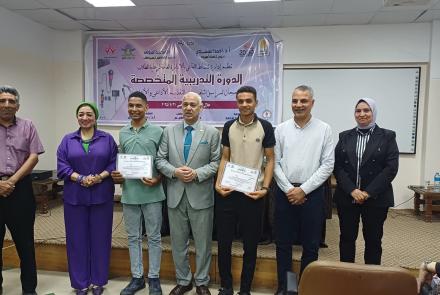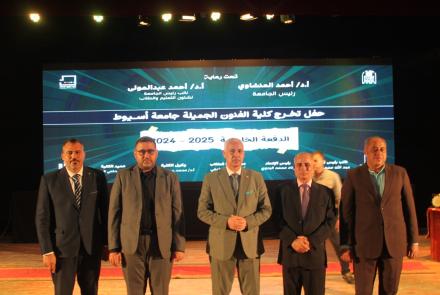" The forum of leaders of the student unions of the Universities of the New Republic of Egypt 2030, under the supervision of Dr. Mohammed Ayman Ashour, Minister of higher education and scientific research, and Dr. Ahmed El-Minshawy, president of Assiut University, organized on Wednesday, February 12, a lecture entitled "The components of national security and the interactions between international relations", for Dr. Rami Ashour, professor of international relations and national security, at the Universities of Egypt and Galala, and fellow of the Military Academy for graduate and Strategic Studies. The seminar comes under the supervision of Dr. Ahmed Abdul Mawla, vice president of the University for education and Student Affairs, Dr. Madiha Darwish, general supervisor of student activities, and Dr. Haitham Ibrahim, Director General of the student welfare department at the University. In the presence of Dr. Rahab Al-dahlia, media advisor to the president of the university, leaders of student unions from various universities, Egyptian institutes, and student delegations from (28) public, national and private universities. At the beginning of the lecture, Dr. Rami Ashour pointed out that the classification of countries, in terms of their degree of progress, depends on the level of human rights in them, and it is one of the most important components of national security for any country in the world, which can only be achieved by achieving development and security together, pointing to the importance of management science to reach this goal. Dr. Rami Ashour reviewed human rights in the heavenly books, in politics, and the law, including a decent life, and the security of the individual for himself and his property, stressing that the lack of their achievement occurs as a result of several factors, the most important of which is poverty, which leads to the spread of crime, and the spread of ignorance, which is a fertile ground for extremism and terrorism, stressing the role of the media and education in fighting corruption, through constructive criticism, spreading the values of respect for difference, and respect for the value of women in society.
The lecture also dealt with the components of Egyptian national security, the challenges and threats it faces at home and abroad, its African dimension, Arab national security, and the policies of major countries.


 Do you have any questions?
Do you have any questions? 





